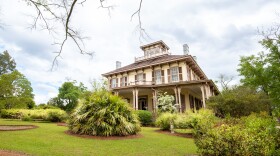
Laura Sullivan
Laura Sullivan is an NPR News investigative correspondent whose work has cast a light on some of the country's most significant issues.
Sullivan is one of NPR's most decorated journalists, with three Peabody Awards and two Alfred I. duPont-Columbia University Silver Batons. She joined NPR in 2004 as a correspondent on the National Desk, covering crime and punishment issues. She joined NPR's investigations unit in 2010. Her investigative reports air regularly on All Things Considered and Morning Edition.
She is also an on-air correspondent for the PBS television show FRONTLINE. Her investigations have examined the in 2021, how in 2020, the in 2019, the in 2018, the in 2017 and the in May 2016, which examined who profits when disaster strikes. The film and grew out of a series of examining the American Red Cross in the aftermath of the Haiti earthquake and Superstorm Sandy. The pieces were honored with her second award from Harvard University's Joan Shorenstein Center on the Press and her third from Investigative Reporters and Editors.
Her unflinching series "," which aired in three parts on All Things Considered in October 2011, examined how lack of knowledge about Native culture and traditions and federal financial funding all influence the decision to remove so many Native-American children from homes in South Dakota. Through more than 150 interviews with state and federal officials, tribal representatives and families from eight South Dakota tribes, plus a review of thousands of records, Sullivan and NPR producers pieced together a narrative of inequality in the foster care system across the state. In addition to her third Peabody, the series also won Sullivan her second Robert F. Kennedy Award.
"Bonding for Profit" – a three-part investigative series that aired on Morning Edition and All Things Considered in 2010 – earned Sullivan her second duPont and Peabody, as well as awards from the Scripps Howard Foundation, Harvard University's Joan Shorenstein Center on the Press, Politics and Public Policy, and the American Bar Association. Working with editor Steve Drummond, Sullivan's stories in this series revealed deep and costly flaws in one of the most common – and commonly misunderstood – elements of the US criminal justice system.
Also in 2011, Sullivan was honored for the second time by Investigative Reporters and Editors for her two part series examining the origins of Arizona's controversial immigration law SB 1070.
For the three-part series, "36 Years of Solitary: Murder, Death and Justice on Angola," she was honored with a 2008 George Foster Peabody Award, a 2008 Investigative Reporters and Editors Award, and her first Robert F. Kennedy Award.
In 2007, Sullivan exposed the epidemic of rape on Native American reservations, which are committed largely by non-Native men, and examined how tribal and federal authorities have failed to investigate those crimes. In addition to a duPont, this two-part series earned Sullivan a DART Award for outstanding reporting, an Edward R. Murrow and her second Gracie Award from the Alliance for Women in Media.
Her first Gracie was for a three-part series examining of the state of solitary confinement in this country. She was also awarded the 2007 Daniel Schorr Journalism Prize for this series.
Before coming to NPR, Sullivan was a Washington correspondent for The Baltimore Sun, where she covered the Justice Department, the FBI and terrorism.
As a student at Northwestern University in 1996, Sullivan worked with two fellow students on a project that ultimately freed four men, including two death-row inmates, who had been wrongfully convicted of an 18-year-old murder on the south side of Chicago. The case led to a review of Illinois' death row and a moratorium on capital punishment in the state, and received several awards.
Outside of her career as a reporter, Sullivan once spent a summer gutting fish in Alaska, and another summer cutting trails outside Yosemite National Park. She says these experiences gave her "a sense of adventure" that comes through in her reporting. Sullivan, who was born and raised in San Francisco, loves traveling the country to report radio stories that "come to life in a way that was never possible in print."
-
Historical markers were once just for American history. But many now claim aliens have visited Earth from outer space — and they aren't hedging.
-
California's lawsuit against Exxon Mobil throws plastic recycling into doubt. We look at what the consumer should do.
-
California has filed a first-of-its-kind lawsuit against ExxonMobil, alleging that the company has spent decades misleading the public about the efficacy of plastic recycling.
-
Historical markers from the Atlantic through the Midwest tell a classic American tale of innocent white settlers killed by Native Americans. Many markers only tell half the story.
-
When a southern town decided to put up a historical marker, few knew it would unlock the secrets of a long-forgotten Civil Rights murder.
-
In 1963, William Lewis Moore was murdered in Alabama while on a civil rights protest walk. Silence around the murder bothered one man for years, until he campaigned to put up a marker about it.
-
More than 180,000 historical markers dot the U.S. in a fractured and confused telling of America — where offensive lies live with impunity, history is distorted and errors are both strange and funny.
-
Historical markers have been used to spread hate — with racist language, ideas and intent. They also have been able to unlock secrets — even from a long-forgotten murder in rural Alabama.
-
Most corners of the country harbor old or erroneous markers of some kind. An NPR investigation examines the proliferation of Confederate markers and a century-long effort to recast the Civil War.
-
The nation's historical markers delight, distort and, sometimes, just get the story wrong.



